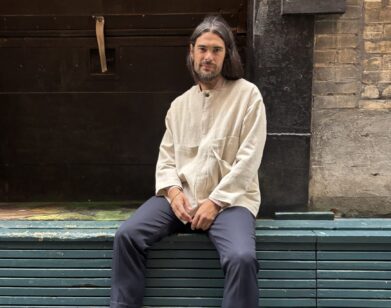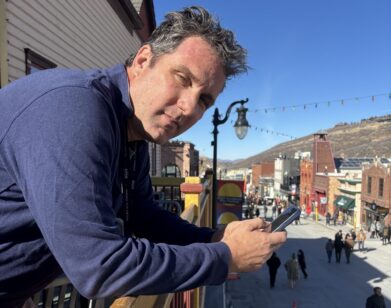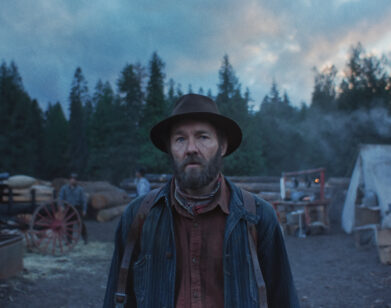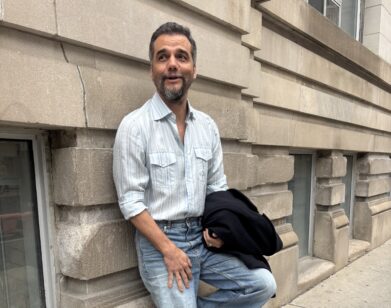George MacKay Puts a Human Face on the Horrors of War in 1917
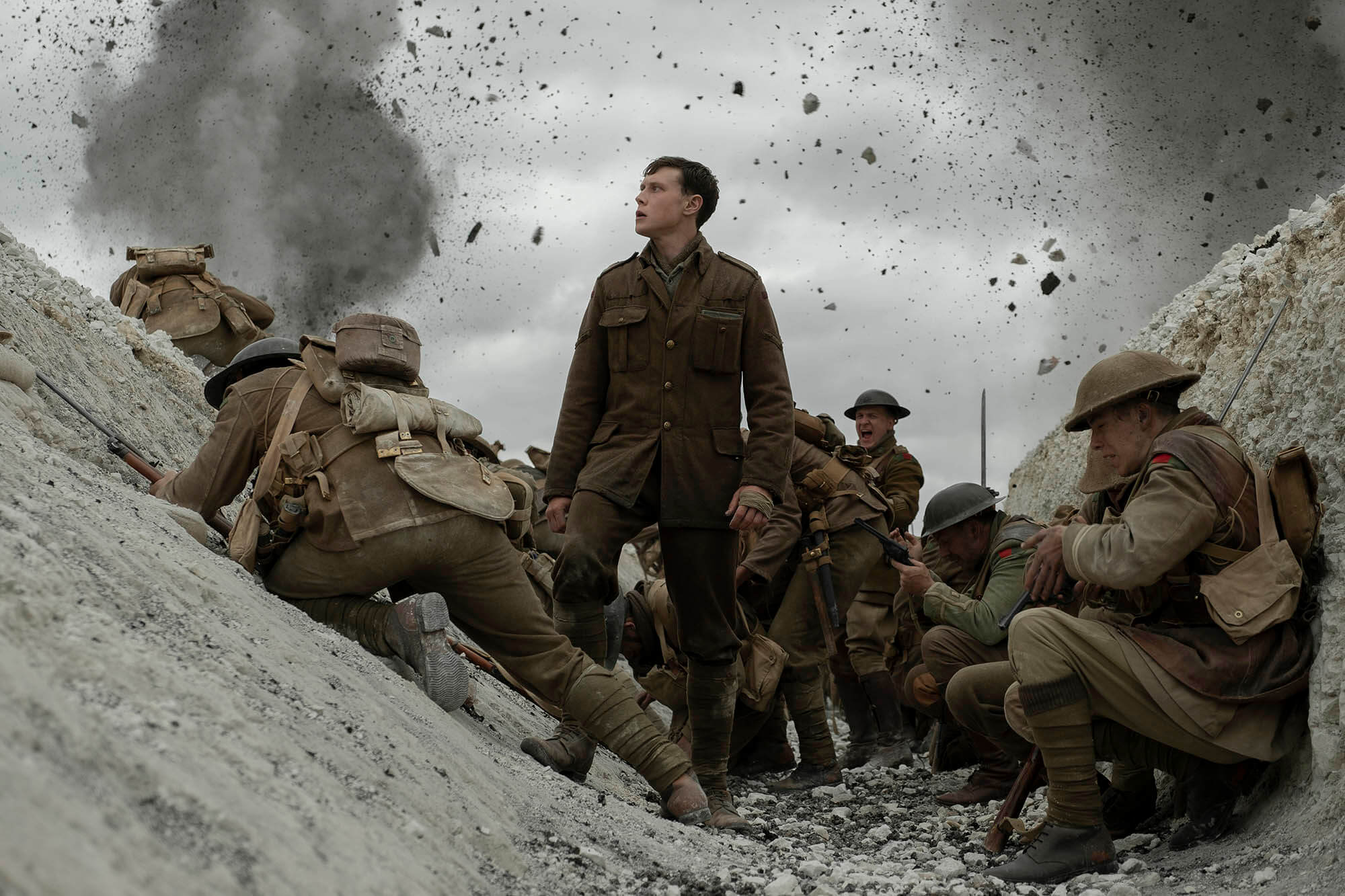
On a sheer technical level, 1917 is unlike any other war movie ever made. Sam Mendes’ breathtaking World War I epic unfolds over what appears two be two single, continuous shots, as it follows two British soldiers who make their way through the charred battlefields of France to deliver a message to a battalion that is about to fall into a German trap. The result is a dazzling, immersive experience that has rightly put cinematographer Roger Deakins at the forefront of the Oscar conversation. But on top of its visual achievement, the movie also delivers an emotional gut punch, thanks to the performances of its two young leads, George MacKay and Dean-Charles Chapman. As Lance Corporal Schofield and Lance Corporal Blake respectively, the British actors are able to convey the fear, determination, and courage in the face of unfathomable horror. Interview recently spoke to MacKay about what he took away from such a unique shoot, what the film taught him about the First World War, and how he’s handling the film’s reception.
———
BEN BARNA: At what point in the process did you find out that this film was going to look like it was done in one continuous take?
GEORGE MACKAY: It was the second audition. Both Dean and I did three auditions. At the first one, I did a take with Nina Gold, who was the casting director. The second one was to read two scenes with Sam Mendes. At that point I wasn’t allowed to read a script. But in the meeting, he talked about the greater idea, gave me a synopsis, and then explained that it was going to be one continuous take and what that would mean for the process of it. On top of the possibility to work on a film with Sam, to work in this new way was really extraordinary.
BARNA: What are some of the biggest adjustments that you had to make as an actor to fit this style of shooting?
MACKAY: This was like a beautiful amalgamation of theater and film in the sense that the biggest kind of adjustment was the biggest lesson, which was to have a much more three-dimensional awareness of my role and the filmmaking process as a whole. Sometimes as an actor, you’re encouraged to be quite singular in your understanding of what’s going on, to focus on the character and to block out everything that distracts from that. That is useful and applicable some of the time. But with this, we had to embrace a sort of inside-outside perspective. We were working, in essence, in a dance with the camera team and with the visual storytelling.
BARNA: The production design in the film is dazzling. Did it make your job easier?
MACKAY: For sure. We all did a huge amount of research and would sort of feed off each other’s ideas, discoveries, and findings. And as you say, the level of detail was truly extraordinary and that just made our job so much easier, because we just had to exist within these environments. We were carrying all the real gear and everything. So much of the work was done for us. It’s everything you see on screen. There were very few visual effects in the film other than the points with which the scenes are stuck together.
BARNA: We’ve seen a lot of World War II movies, but World War I is not something you see depicted on the big screen as much. What were some of the most surprising or shocking things about that war that you discovered while making this film?
MACKAY: Well, it’s funny because in Britain, the First World War, culturally, is much more relevant, even if it’s not represented internationally as much in cinema. But the biggest shock probably wasn’t necessarily a fact, per se. In exploring these characters and trying to embody these men, you discover they’re men before they are soldiers. And having that kind of personal insight when becoming this character who experiences what millions of men did, it gave me a much more personal insight into the catastrophic loss of life. I think it’s quite difficult to wrap your head around the numbers and really take it in. It’s almost unfathomable, in some sense, to personally understand the loss, that every man had a family.
The amount of waiting around is another thing I hadn’t really considered. When you think of a war, you think of it in the eye of the storm, always. But I think it was actually really hard to kind of level with the boredom that would then be punctured by crazy violence, and the randomness of it all. You could be sitting there in the middle of nowhere not expecting anything, and all of a sudden, a shell goes off and it obliterates the man next to you.
BARNA: You and Dean are relative unknowns, which I think really helps the film. It helps the audience put themselves in your shoes, and it lends the cameos from more recognizable actors throughout the film more of a pop. Do you think that was a deliberate choice on Sam’s part?
MACKAY: It was never discussed with us, but I’m sure that played into it, because the whole film is geared towards giving you the most immersive and emotional experience possible. And perhaps, if you were to recognize the people taking you through that story as actors, I think it would be harder to immerse yourself in. So I’m sure there was a conscious decision in having us kind of be unrecognizable. That’s what I think is beautiful about the film, it celebrates the ordinary. These are ordinary men. They’re not massively decorated soldiers or revolutionaries. They’re just blokes.
BARNA: What was your reaction when you saw the finished product?
MACKAY: I had quite an emotional reaction when I saw it for the very first time. It made me very clear on who means the most to me in my life and where I root myself. To me, that’s what the film is about. The war is undoubtedly very present in the film. It’s the context for it, but it’s a context which allows anyone watching it or the people telling it to explore what it is to be human. War is a terrible place to be, but it’s an arena in which men and women are stretched to their absolute limits physically and emotionally. And when you’re stretched to your limits, it actually distills what means most to you and what’s essential to you.
BARNA: How are you handling the overwhelmingly positive reaction to the film?
MACKAY: Beyond anything, it’s a privilege to be a part of the film, to be cast in the film. It’s a privilege to work with the entire crew and cast the way that we did. And for me that’s sort of always where a film ends. That’s when you have to let go of the experience and be at peace with whatever happens. I’m trying not to get caught up in the positive reaction and just let the experience be what I know of it. But by the same token, I don’t want to take it for granted, either, because it is a beautiful rarity to be a part of something that is so well-received.

